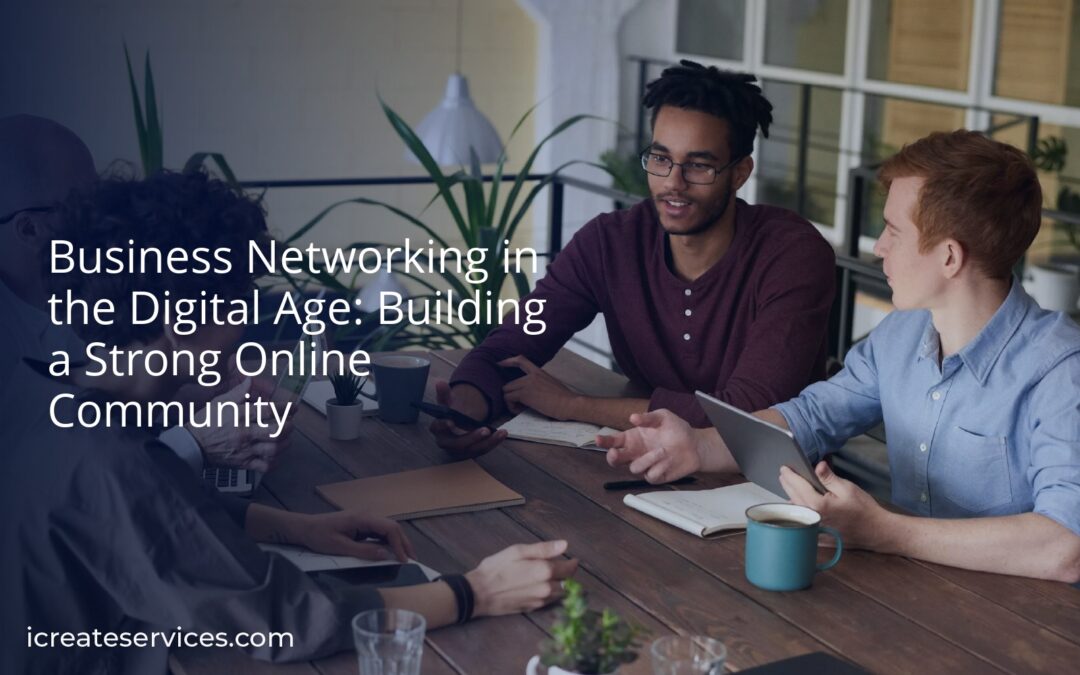Business networking has evolved to become a powerful tool for building a strong online community and expanding professional connections. With the rise of digital networking platforms and virtual networking events, professionals can now connect with prospects and partners from the comfort of their own office, without the need to attend in-person events.
While online networking will never completely replace in-person networking, it has proven to be a valuable complement, especially in times like the COVID-19 pandemic when in-person interactions are limited. Recent research shows that 68% of people still prefer in-person networking, but the popularity of online networking has increased significantly in recent years.
Key Takeaways:
- Online networking is a solid alternative or complement to in-person networking.
- There are various online networking platforms available, such as LinkedIn, Facebook groups, Slack communities, and more.
- Optimizing your LinkedIn profile and engaging with relevant content can be key to successful online networking.
- Virtual networking events provide unique opportunities for entrepreneurs to connect and grow their business.
- In the future, both in-person and online networking will continue to play important roles in building professional relationships.
Overall, business networking in the digital age offers professionals the flexibility and convenience to connect with others in a meaningful way. Whether through online networking groups, LinkedIn, Facebook communities, or virtual networking events, professionals can expand their reach and make valuable connections. The future of networking lies in the integration of both in-person and online interactions, leveraging the advantages offered by each platform to build a strong and diverse professional network.
The Rise of Online Networking Platforms
With the rise of online networking platforms, professionals now have a myriad of opportunities to connect with like-minded individuals, expand their network, and foster meaningful business relationships. These digital platforms have revolutionized the way professionals network, providing a convenient and efficient way to make connections without the need for in-person interactions.
One of the most popular online networking platforms is LinkedIn, which allows professionals to create virtual resumes, connect with industry peers, and engage in professional discussions. By optimizing their LinkedIn profiles and actively participating in relevant groups and discussions, professionals can showcase their expertise and make valuable connections in their field.
Facebook groups have also emerged as a valuable networking platform. While there may be some less reputable groups out there, joining private groups and carefully choosing communities to engage with can lead to fruitful networking opportunities. By sharing insights, knowledge, and resources with other group members, professionals can build meaningful connections and discover new business opportunities.
Slack communities are another popular option for online networking. These virtual communities are designed for business owners, freelancers, and entrepreneurs to connect and collaborate. Slack provides a space for professionals to communicate, share ideas, and seek advice from others in the industry. Popular Slack communities like Leapers and Copy Club offer valuable networking opportunities and a sense of community among professionals.
The rise of online networking platforms has provided professionals with the ability to connect and collaborate with a diverse range of individuals from all over the world. These platforms have opened up new possibilities for networking, making it accessible to individuals who may not have had the time or resources to attend in-person events. However, it’s important to remember that while online networking is convenient, it should not replace in-person networking entirely. A balanced approach that includes both online and in-person networking can lead to the most successful outcomes.
Tips for Successful Online Networking
To make the most out of online networking, it is essential to employ effective strategies and follow certain guidelines that will help you build a strong digital network. Whether you are new to online networking or looking to enhance your current efforts, here are some tips to help you succeed:
- Optimize your LinkedIn profile: LinkedIn is a powerful platform for professional networking. Ensure that your profile is complete, including a professional photo, a compelling headline, and a well-written summary. Use keywords relevant to your industry and include your achievements and experiences to showcase your expertise.
- Engage with relevant content: Stay active on social media platforms, especially LinkedIn. Participate in industry-specific discussions, comment on posts, and share valuable content. By engaging with others and providing valuable insights, you can establish yourself as a thought leader and attract connections with similar interests.
- Participate in online networking groups: Join online networking groups and communities relevant to your industry or profession. Engage in conversations, ask questions, and offer help to others. Networking groups provide opportunities to connect with like-minded professionals, exchange ideas, and build relationships.
- Find the right Facebook communities: Look for private Facebook groups that align with your interests and professional goals. These groups can be a valuable source of connections and opportunities. Before joining, read the group description and rules to ensure that it is a quality community that aligns with your networking objectives.
Remember, successful online networking requires authenticity and respect. Be genuine in your interactions, avoid spammy behavior, and focus on building meaningful connections. By following these tips, you can leverage the power of online networking to expand your reach, gain new insights, and enhance your professional growth.
Leveraging Virtual Networking Events
Virtual networking events have become increasingly popular, providing entrepreneurs with valuable opportunities to connect, collaborate, and expand their professional network without the constraints of physical attendance. These online events have proven to be a convenient and effective way to build relationships and explore new business opportunities. Here are some key strategies for leveraging virtual networking events:
Choose the right events:
Before participating in virtual networking events, it is crucial to research and select the ones that align with your industry and goals. Look for events that attract professionals in your field or target audience. Consider factors such as the event’s format, speakers, and topics to ensure it will provide value and relevant connections.
Prepare your pitch:
Just like in-person networking, it’s important to have a well-crafted elevator pitch ready for virtual events. This concise introduction should highlight your expertise, unique value proposition, and the type of connections you are seeking. Practice and refine your pitch to make a memorable impression in the digital space.
Engage actively:
During virtual networking events, actively engage with other participants through chat features, Q&A sessions, or breakout rooms. Take the initiative to introduce yourself, ask questions, and offer insights. By actively participating, you can make meaningful connections and stand out from the crowd.
Follow up promptly:
After the event, follow up with the connections you made to solidify those relationships. Send personalized emails or LinkedIn messages to express your interest in continuing the conversation. Remember to mention specific points of discussion or any action items discussed during the event. Prompt and personalized follow-ups demonstrate your professionalism and commitment to building a strong network.
Virtual networking events offer entrepreneurs the flexibility and convenience to connect with professionals from all over the world. By selecting the right events, preparing an impactful pitch, actively engaging with others, and following up promptly, you can leverage these events to expand your network and foster valuable business relationships.
The Future of Networking in the Digital Age
As networking continues to evolve in the digital age, it is clear that a combination of in-person and online networking will play a vital role in building and maintaining a strong professional community. The COVID-19 pandemic has accelerated the adoption of online networking platforms and virtual networking events, highlighting their effectiveness and convenience. However, it is important to recognize that in-person networking still holds value and provides unique opportunities for connection.
Online networking platforms have revolutionized the way professionals connect and collaborate. Platforms such as LinkedIn, Facebook groups, and Slack communities have made it easier than ever to reach a global audience and expand your network beyond geographical boundaries. These platforms allow professionals to showcase their expertise, engage in industry discussions, and connect with like-minded individuals who share similar interests and goals. Online networking also provides a platform for sharing valuable resources, advice, and opportunities, fostering a sense of community in the digital space.
Virtual networking events have also become increasingly popular and are likely to continue shaping the future of networking. These events provide entrepreneurs and professionals with the opportunity to connect with industry leaders, potential clients or customers, and peers from around the world. From panel discussions to virtual trade shows, these events offer a convenient and cost-effective way to network and stay up-to-date with industry trends. The ability to attend these events from the comfort of your own space eliminates the need for travel and opens doors to a wider range of networking opportunities.
Looking ahead, the future of networking in the digital age holds exciting possibilities. Advancements in technology, such as virtual reality and artificial intelligence, may further enhance online networking experiences, recreating the immersive feel of in-person interactions. Additionally, the integration of virtual networking tools into existing platforms may streamline the process of connecting with professionals in a more targeted and personalized manner.
While online networking continues to evolve, it is important to maintain a balance between virtual and in-person interactions. In-person networking events provide a unique environment for building deeper connections, establishing trust, and solidifying professional relationships. Face-to-face interactions allow for nuanced communication, non-verbal cues, and a level of authenticity that can be difficult to replicate in digital spaces.
In conclusion, the future of networking in the digital age is a dynamic combination of online and in-person interactions. Both have their unique benefits and can be leveraged to build a strong professional community. As technology continues to advance, the possibilities for networking will only continue to expand, offering professionals even more ways to connect, collaborate, and succeed in their industries.
- Demystifying Fuel Test Procedures and Standards - January 16, 2025
- The Benefits of SAP Invoice Management in Financial Processes - December 4, 2024
- Enterprise Software for Comprehensive Risk Management - July 29, 2024




